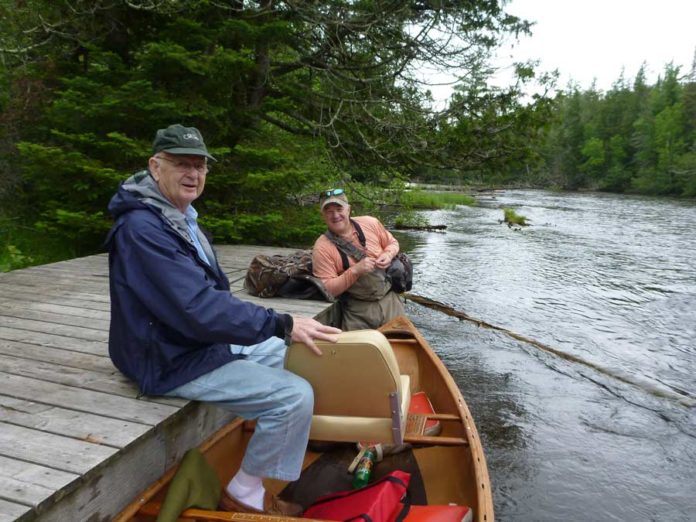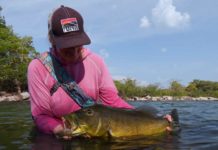Photo courtesy Jim Lepage
In July, Dick Pobst—a legendary Michigan angler, entomologist, fly-shop owner, and author—passed away after a remarkable life. After a stint in the Army and a career in international business, Dick changed courses, becoming a leader in the fly-fishing industry. From 1975 to 2000, Dick and his wife, Nancy, ran the Thornapple Orvis Shop, a fly shop in Grand Rapids, Michigan. (Nancy passed away in 2018.) They also became Regional Business Managers for Orvis, and Orvis Chairman Perk Perkins remembers “the amazing job he and Nancy did for us in the Midwest.”
In honor of his incredible influence, a plaque honoring Dick’s contributions will be placed in the Orvis Grand Rapids store.

As an author, Pobst focused on the insects that trout eat, and his books include Trout Stream Insects: An Orvis Streamside Guide, Orvis Vest Pocket Guide to Mayflies: An Illustrated Reference To The Most Important Hatches Of North America, and The Caddisfly Handbook: An Orvis Streamside Guide. His autobiography, A Funny Thing Happened on the Way to the Trout Stream: 40 Years Trout Fishing in Europe and North America was published in 2011.
To give a sense of how dedicated Dick was to his craft, check out this wonderful story told by his daughter, Andrea DelGiudice:
My father was an avid fly fisherman. As much as he loved to fish, he also truly loved entomology and studying the various bugs. In his book Trout Stream Insects, there are many photographs of different flies at different stages of their life cycle. What is not as well know is just how he and Dr. Carl Richards got those pictures.
My father was also an inventor, and when he need something, he would find a way to make it work. Many projects such as the Keel Fly and Super Float were invented and made in our basement or garage. As the only child still at home, I was often an unwitting participant in his schemes. Many hours of my childhood were spent bottling and labeling chemicals and counting hooks from packages of 1,000 into piles of 10 and sorting them into envelopes to be sold at the Thornapple Orvis Shop or seining the rivers for more bugs. I would not trade those hours now for anything.
Much to my Mother’s dismay, multiple fish tanks were installed and connected to simulate a trout stream in our basement. Sludge from the Rogue River was placed in the bottom of the tanks. Lights were set with a timer to simulate daylight and nighttime. Multiple video cameras were set up to capture the moment that anything happened. The kitchen timer was set, and anyone who was home when it went off had to run downstairs and change out all of the tapes and label them accordingly. (It was the pre-digital age!)
I can still hear my Mothers saying, “Dick, I hope you have thought about what will happen when those bugs all hatch.” She was not eager to venture to the basement to see what his solution was. He had, in fact, loosely place cheese cloth over the tops of the tanks. He would reassure her that it was “taken care of.”
One day, we came home and found that the living room curtains were smothered with bugs. Thousands of them had hatched and got into the heating ducts and were molting and growing in the house. Mom took one look at Dad and said, “You have exactly two days to clean this mess up.” Then she looked and me and said, “Pack a bag, you and I are going to Chicago and TIFFANY’s for the weekend.”
We learned later that Dad had called everyone he knew that owned a shop vac, and they sucked them all up and released them into the Grand River near out house. I suspect that beer and pizza were well supplied! Dr. Richards and Dick Pobst spent many hours reviewing the tapes and finding stills of some of the insects–images which they used in the book. I don’t think they actually got very much usable footage from this adventure. Many more hours were spent in the evenings and wee hours of the morning by the river waiting for just the right photo opportunity.
Even after he retired, Dick continued to write and fish. Check out this video by Steve Kuieck of Muskegon River Lodge, as Pobst gets it done at age 87.
Dick Pobst’s legacy–in Michigan and throughout the fly-fishing industry–will be felt for a long time, and thousands of anglers share fond memories of spending time with Dick in the fly shop and on the river. He will be missed.

Credit: Source link






























